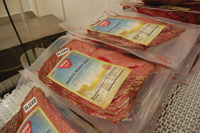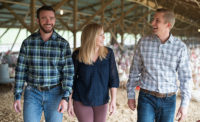At 23 years old, most people are just starting off their career, struggling to make it through the ranks at an entry-level job. At 23 years old, Larry Vad was running his own meat business, which he had started from scratch.
“People were coming up to me and saying, 'Is this your father's business?' and I would say, 'No, it's mine.' They were blown away that someone so young could do it,” Vad recalls.
He jokes that he was basically forced into business by his customers. At the time, he had been working at an HRI meat company owned by the father of one of his friends. The business was sold, and the new owner didn't seem to take much of an interest in it, Vad says. So he asked if he could buy the company from the owner. Instead, he was fired.
The very next week, he started getting calls from customers asking why he wasn't at work, and he found himself getting back into making deliveries and servicing clients.
“I had a little Toyota 4X4 truck with a camper shell on it, and I started going downtown, picking up product and delivering it to restaurants,” he says. A former business associate gave him space in a building in which to work, and after a month, the two became partners. That was the beginning of Ideal Meat & Provisions, which was incorporated in 1986 in Northridge, Calif. Now, nearly 25 years later, Ideal Meat has grown to become an exclusive supplier to a premium beef program and supplies high-end product to many leading restaurants, distributors and other processors. Since his partner retired from the business in 1996, Vad has served as president and CEO. The company that fired Vad? It went out of business six months later.
“I came from nothing,” Vad says about his start in the industry. “I lost my father at 15. I grew up in Van Nuys, which is not a great part of town.” In high school, some of his friends were the perpetual troublemakers, and some came from good families and were doing well. “I quickly said that I wanted to be like them. I knew the only way I could get there was to work hard, because I didn't have anybody I could reach out to.”
Ideal Meat has three different elements to it. At the company's infancy, it delivered meat to restaurants in and around the Los Angeles area, and it continues that operation to this day. Along with high-end steaks and chops that are served in many white tablecloth restaurants, the company is also known for its ground beef and hamburger patties. Ideal Meat also services many smaller and mid-size distributors that do not own their own meat companies. Vad notes that while the foodservice industry has struggled lately, the company has actually grown the foodservice side of the business.
“We are supporting the broadline distributors that we service,” he explains. “We are their center-of-the-plate specialists, and we go out and visit their customers with them and educate them on these products.”
The third business segment is Ideal Meat's premium beef program.
“We've established a relationship where we have the ability to buy high-end Angus and choice and prime products that we sell to other distributors,” he says, “including other processors that compete with us, because they can't source the product that we can, and we're able to get it to them at a fair-market price.”
Premium programs
Vad says that at the time Ideal Meat entered into premium meats, the company primarily produced commodity meat products.
“I realized that we would never gain equity by doing that,” he says. “We would always be banging our heads against every single competitor out there.” He decided that the company needed to brand its products, as well as align with a partner that could grow with Ideal and give the company a product that no one else could get.
Vad looked for what he felt was the best beef packer in the industry, and he settled on a company that had two Midwest plants that harvested corn-fed cattle from that region. The packer agreed to give Ideal Meat control over its brands in his region, provided he would continue to grow them every year. The agreement was made six years ago, and the support between the two companies remains strong. Ideal Meat has been able to grow its premium program tremendously in its market area, and the packer continues to lend its support when Vad appears at food trade shows and such. The boxes of beef products that Ideal Meat ships feature both companies' logos.
Vad says that the program has enabled Ideal Meat to compete on more than just price.
“When [customers] enjoy that product and want it again, they have to get it here,” he says. “They can't just dial up another distributor or a small meat company and get this product. They can get a different brand, or a different premium program, but it's not ours.”
Ideal Meat has also carried that premium program concept to its pork business. Though pork is a much smaller aspect of the company's output, it still carries a higher-grade of pork as well.
The company's market range is about a 200-mile radius around its headquarters in Northridge. The area used to be even larger, but Vad realized that with the cost of fuel, it wasn't beneficial to keep sending his trucks so far off. Ideal Meat’s products are still reaching its far-off customers, though.
“We reduced our fleet of trucks, and basically reduced the territory and started going even harder on the full-service and broadline companies, to let them use their fleets of trucks and their sales people,” he explains.
Green plans
Vad's plans for the future involve making Ideal Meat more environmentally friendly. The initial idea came about when he was driving behind a Los Angeles bus and realized that it didn't smoke and stink like buses did in his youth. After researching the subject, he learned that all city vehicles run on clean-burning natural gas, and he decided to look into converting his truck fleet to natural gas.
“Then I found out if you did that, you could actually have your own natural gas refueling station at your facility,” he explains. “By doing that, it would be a third of the cost of what diesel fuel would be per gallon. So not only are you benefiting the environment, it's a huge cost savings to boot.”
Vad notes that the actual process of getting a fueling station added to a facility takes some time, and he estimates that he is anywhere from six months to a year away from having the project completed. Once that happens, though, all Ideal Meat trucks will either be retrofitted to run on natural gas or bought new from the manufacturer. The refrigeration units on the trucks will be electric, meaning they won't give out any pollution either. Vad, who currently drives a hybrid car, plans on buying a personal car that also runs on natural gas.
Another large project involves converting the 15,000-square-foot facility to solar power. With the roof space on the building, Vad estimates that he can save about 25 percent of his annual electric bill. The return on investment for that project will be about five-and-a-half years, he says.
While the economic benefits of those projects are substantial, Vad stresses that it is also the right thing to do.
“You watch the sun come up every day, and you watch everything that absorbs the power of that sun on a daily basis, and then we're sitting here drilling for oil. It does zero harm to take this power from the sun, and it's ridiculous that we don't,” he says. “Natural gas is not necessarily the fix, but it's [also] a great stepping stone, because it burns so much cleaner. It's all domestic, and we don't need to buy any foreign natural gas.”
Once those two large-scale projects are completed, Vad adds there will be many more smaller changes made to the company, such as moving to more environmentally friendly packaging. The company's sales presentations will also be changed to highlight the initiatives. The presentation will, Vad says, “add in the fact that these great products that we're doing will be in a much greener package, being delivered in a much greener vehicle and being produced in a much greener plant.”



Report Abusive Comment